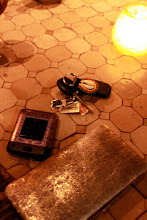I've made it all the way through my Surgery rotation (a 3-month slog!) and I'm 4 weeks into my Medicine rotation (another 3-month slog...what was I thinking?). I'm still learning something every day, but I haven't been very good with recording my discoveries. So here's a braindump of lessons from the wards:
Lesson 1:
Your first shelf exam will crush your soul. Twice. First, you will leave the exam hall wondering if shelf exams are supposed to feel the way you feel at that moment. Then, you'll get your grade and wonder if you've been learning anything at all and/or whether you're cut out to be a physician or if you should just quit now with fond memories of pre-clinical success to look back on. Unfortunately, there's no way to go back and change your performance on your initial shelf, and as Abraham Lincoln (or someone) said, If at first you don't succeed, try, try again. Learning during clinicals is a whole different ball game from learning during pre-clinicals. All of a sudden, you have to not only work all or most of the day (and often 6 days a week), but also go home and study. It's kind of a cruel joke, really. But I figure if thousands of doctors have done it before me, I can do it too.
Lesson 2:
It's really difficult to deal with emotional patients. I like to think of myself as a compassionate person, but I find it hard to comfort a patient when he or she is crying, or talking about how rough life has been lately. It just feels very strange.
Lesson 3:
On wards, you'll probably work with pretty darn awesome scientists/clinicians without even realizing it. In the past week, I've worked with one doctor who was instrumental in discovering the connection between H. pylori and ulcers, who is now working on curing C. diffcolitis, and another who may have found a cure to Hepatitis C. No big deal. [For those of you not in medicine, those are both really big deals.]
Lesson 4:
I've said it before and I'll say it again--having a good team makes all the difference, for real. I have some pretty darn sweet interns, a friendly upper-level, and a couple of great fellow students on my team right now, and if I have to spend the day in the hospital, it's fun to talk to them while I do it.
Lesson 5:
A lot of the time, when it rains, it pours.
Lesson 6:
You're more likely to hear an Internal Medicine resident complain about a pointless admit (for instance, a patient with a history of cancer who's had a 12-hour history of nausea and vomiting and shows absolutely no signs of dehydration) than a very complicated patient. I found that pretty interesting: residents prefer not to have a really "easy" patient who doesn't really need to be hospitalized. They'd rather take care of patients who really need tertiary care, like a hospital provides.
Lesson 7:
When you're a medical student, you can't do a whole lot to help your patients. You can suggest lab tests or imaging studies to your residents, or perhaps pick up on the fact that a patient isn't receiving an important drug to prevent blood clots. But not really much else. What you can do is simple things for your patients, like getting them a toothbrush when they ask, or helping them take their hair out of a ponytail (which was placed when the patient was intubated). Patients tend to be pretty grateful for these sorts of actions, and if something so simple can brighten a hospitalized person's day, it's worth doing, especially when, as a student, you have many fewer constraints on your time compared to your residents.
Lesson 8:
That being said, there will always be patients who seem to need to complain about at least one thing every day. And sometimes you can't do anything to address their complaints, and you don't really want to stand around and listen to them. But like most people who are venting their frustrations, many patients benefit simply from having someone commiserate, if only for a little while every day.

No comments:
Post a Comment